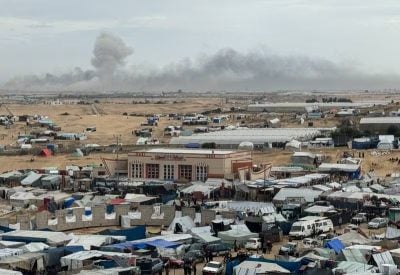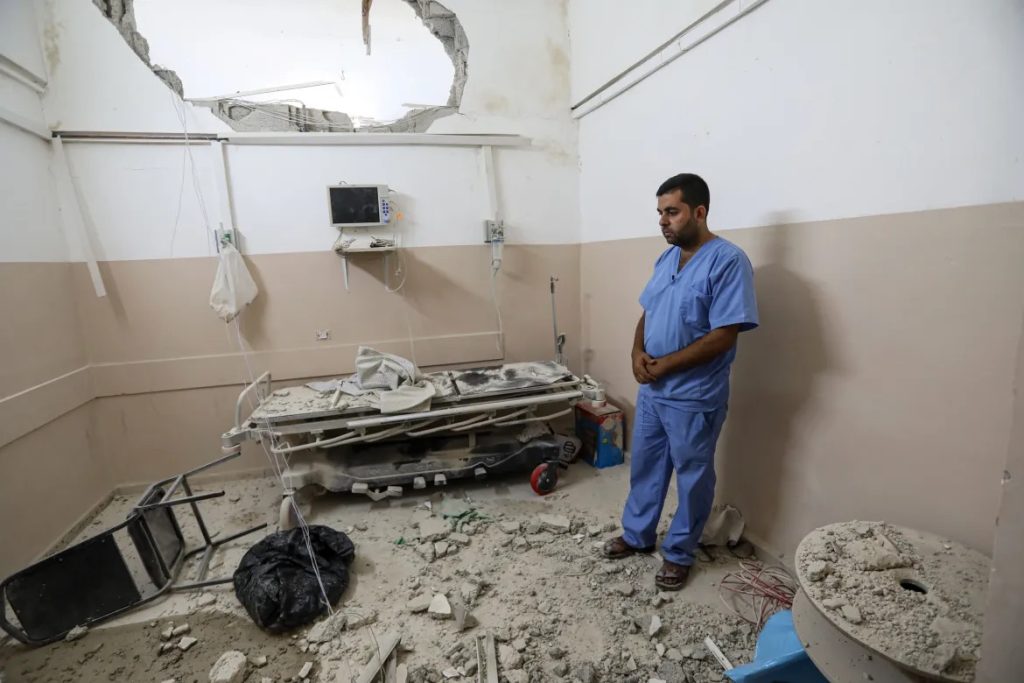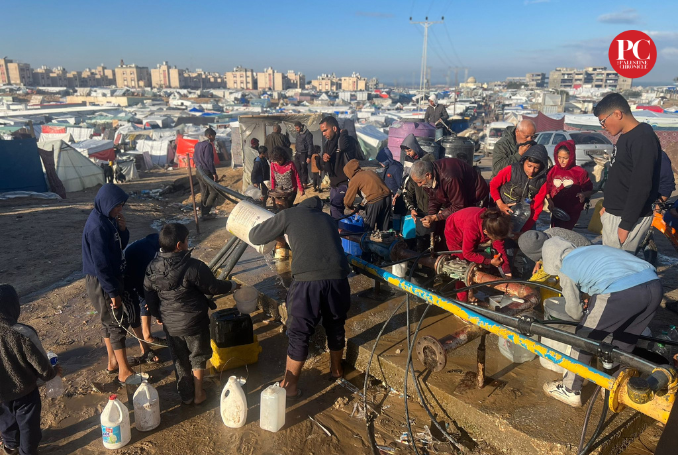Gaza Hospital Patients in ‘Extreme Danger’ as Strikes Kill 130 Across Enclave
Doctors in Khan Younis cannot move corpses to mortuaries as medical centres remain under attack

All Global Research articles can be read in 51 languages by activating the Translate Website button below the author’s name (only available in desktop version).
To receive Global Research’s Daily Newsletter (selected articles), click here.
Click the share button above to email/forward this article to your friends and colleagues. Follow us on Instagram and Twitter and subscribe to our Telegram Channel. Feel free to repost and share widely Global Research articles.
Big Tech’s Effort to Silence Truth-tellers: Global Research Online Referral Campaign
***
Patients, staff and displaced Palestinians at Nasser Hospital are in “extreme danger”, the Gaza Health Ministry has warned, describing catastrophic conditions at the Khan Younis facility as Israel continues to lay siege to southern Gaza.
Displaced people sheltering in the hospital have been ordered to evacuate but are being shot while trying to flee the complex, the ministry said in a statement on Tuesday.
Medics and patients have been ordered to remain in the building, where sewage has flooded the emergency department.
Medical staff cannot move corpses to the mortuary due to the dangerous conditions, said ministry spokesman Dr Ashraf Al Qudra.
More than 130 Palestinians were killed during overnight Israeli strikes on Gaza, bringing the death toll across the enclave to nearly 28,500 and 68,000 wounded since October 7.
Schools surrounding Nasser Hospital were also set on fire by Israeli shelling, and the ministry warned an epidemic may be hard to avoid as waste accumulates.
Dr Suleiman Qaoud surveys the damage at the Rantisi Specialist Hospital, part of the Nasser Medical Complex in Gaza City, following Israeli missile attacks on November 6, 2023 [Abdelhakim Abu Riash/Al Jazeera]
As a ground operation on the southern city of Rafah looms, many of the 1.4 million people who have sought refuge there are now moving north, back towards central Gaza, only to find their homes destroyed.
Abu Hamza Ali, originally from Al Shijaiaa in northern Gaza, is among those who have decided to move again. He had already relocated to Rafah because of the war, but was loading all his belongings on to a truck to head back north to central Gaza.
“Everywhere is dangerous, and I am staying in Rafah in a tent, so I will move the tent away from Rafah,” he told The National.
He initially fled his home to Nuseirat camp in central Gaza, then moved to Rafah, and now he is returning to Deir Al Balah.
“From the beginning, I didn’t plan on leaving my home. If the Israeli army intends to harm us, why did they tell us to flee to the south for our safety? Now, they have targeted us in the south,” he added.
The UN and foreign nations have repeatedly warned Israel against launching a full-scale ground offensive on Rafah, bordering Egypt, which is the last place of refuge for more than half of Gaza’s population.
Israeli attacks on the city have already caused widespread devastation, including during a hostage rescue operation which killed at least 67 Palestinians on Monday morning.
In anticipation of a potential Israeli offensive against Rafah, South Africa announced on Tuesday that it had sent an urgent request to the International Court of Justice.
“In a request submitted to the court yesterday, the South African government said it was gravely concerned that the unprecedented military offensive against Rafah, as announced by the State of Israel, has already led to and will result in further large-scale killing, harm, and destruction,” it said in a statement posted to the government website.
An Israeli invasion of Rafah “would be in serious and irreparable breach both of the Genocide Convention and of the court’s order of 26 January, 2024,” it added.
Late last month, the top UN court ordered Israel to do all it can to prevent death, destruction, and any acts of genocide in Gaza.
Israeli Prime Minister Benjamin Netanyahu has stood firm on his decision to invade the city, saying enough hostages are still alive to warrant military action.
Palestinians line up to fetch some water in a refugee camp in Gaza. (Photo: Mahmoud Ajjour, The Palestine Chronicle)
According to International Court of Justice statutes quoted by South Africa, the court may at any time rule on factors that “require the indication of provisional measures which ought to be taken or complied with by any or all of the parties”.
“South Africa trusts this matter will receive the necessary urgency in light of the daily death toll in Gaza,” it added.
On the ground, civilians struggle to guess where they will be safe.
Alongside bombing Khan Younis and Rafah in southern Gaza, the Israeli military has also continued to hit targets in central Gaza. An air strike on Tuesday killed at least 16 people in the Nuseirat refugee camp there.
Soha Salah, along with her three children, cannot find a place to stay.
“I was sitting with our relatives in their house, and their house was partially destroyed due to Israeli shelling. So, I decided to leave Rafah because my children are scared,” she told The National.
“I thought maybe I could find one of the UNRWA schools, but all schools are full. I am also afraid of diseases, so where should I go?”
Abu Al Saeed Al Sousi, who owned a group of well-known falafel shops in Gaza, stands in front of a large frying pan, preparing falafel in Deir Al Balah.
His shops were completely destroyed, so he fled to central Gaza and started anew, frying food on firewood. Shortages force him to serve falafel without bread or parsley.
“We don’t have any resources here. Everything is difficult. It takes time because firewood is not as fast as gas,” Mr Al Sousi told The National.
“The prices are higher than before because the ingredients cost me a lot, but I want my shop to continue providing services for the people,” he added.
*
Note to readers: Please click the share button above. Follow us on Instagram and Twitter and subscribe to our Telegram Channel. Feel free to repost and share widely Global Research articles.
Featured image: Smoke rises during an Israeli ground operation in Khan Younis, seen from a camp for displaced Palestinians in Rafah, southern Gaza. Reuters



